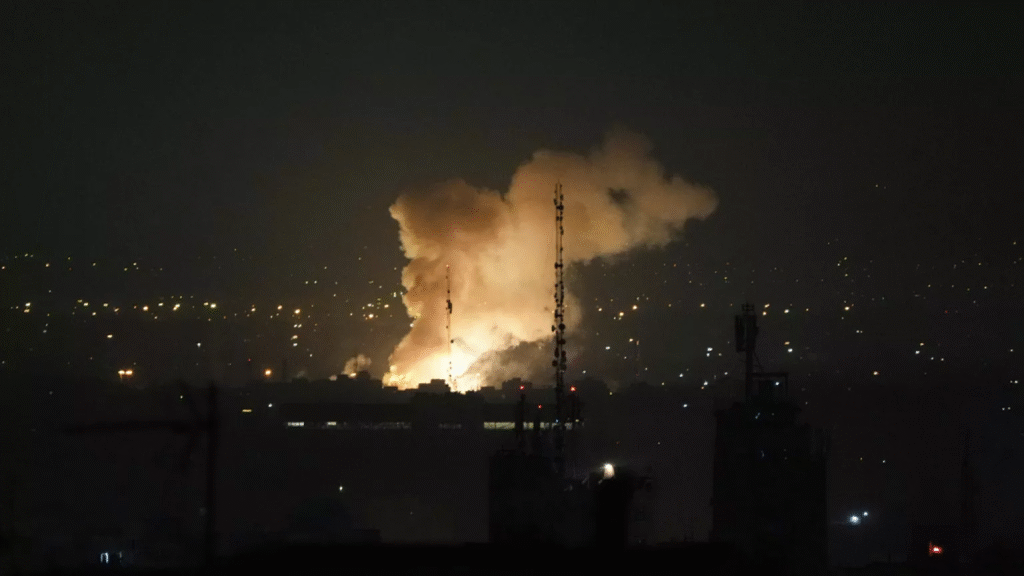TEL AVIV/DUBAI/WASHINGTON After four days of escalating hostilities between Israel and Iran, Israeli officials claim significant progress toward neutralizing what they describe as critical threats posed by Iran’s nuclear and missile programs. Meanwhile, Iranian ballistic missiles struck Tel Aviv and Haifa in the early hours of Monday, killing at least eight civilians and injuring over 100 others, as both nations brace for further escalation.
Israeli Prime Minister Benjamin Netanyahu addressed soldiers at Tel Nof Airbase, declaring:
“We are on our way to achieving our two main objectives: eliminating the nuclear threat and eliminating the missile threat.”
Iran Threatens to Exit Nuclear Treaty
In response to Israel’s aerial bombardment campaign, Iran’s parliament is reportedly preparing legislation to withdraw from the Nuclear Non-Proliferation Treaty (NPT). If passed, the bill would significantly raise concerns among Western nations, many of which suspect Tehran seeks to develop nuclear weapons
an accusation Iran has consistently denied.
“Such a proposal is just being prepared,” said Foreign Ministry Spokesperson Esmaeil Baghaei, noting that coordination with parliament will continue in later stages.
The move comes just days after the International Atomic Energy Agency (IAEA) declared that Iran was in violation of its NPT obligations. Iran, however, has reiterated that its nuclear ambitions remain strictly peaceful.
Israeli Cities Under Fire
In a retaliatory move, Iran launched seven ballistic missiles into Israeli territory, with direct hits reported in Tel Aviv and Haifa. Residential neighborhoods, including areas near the U.S. embassy in Tel Aviv, were heavily damaged. One missile struck near Shuk HaCarmel, a bustling public market.
“It’s terrifying because it’s so unknown,” said Guydo Tetelbaun, a 31-year-old chef who survived the blast. “This could be the beginning of a long time like this or worse.”
Emergency services confirmed that fires broke out at a power station in Haifa, and search and rescue operations are underway in neighborhoods hit by overnight barrages.
Civilian Toll Mounts on Both Sides
Iranian officials report that the death toll has climbed to 224, with 90% of casualties being civilians, following days of Israeli airstrikes that targeted Iran’s military, intelligence, and nuclear infrastructure. A hospital in Kermanshah province sustained direct damage, with local authorities citing significant destruction.
In Israel, at least 24 civilians have died since the conflict began, with over 100 injured. Officials confirmed the deaths of four senior Iranian intelligence officials, including the head of the Revolutionary Guards’ intelligence division, in targeted strikes.
Tehran Accuses Israel of Sabotage
Iran claims that dozens of alleged Israeli-linked spies and saboteurs have been arrested since Friday. Authorities say the wave of arrests is linked to coordinated efforts to undermine Iranian military assets from within.
In a statement issued Monday, the Revolutionary Guards said their latest attack used a new method that overwhelmed Israel’s layered air defense systems, allegedly causing the IDF’s own defenses to misfire a claim that has yet to be verified.
Global Repercussions and Economic Fallout
While oil prices initially surged 7% on Friday amid fears of regional instability, they dipped on Monday after analysts confirmed that oil production and export infrastructure remain intact in both countries. Asian financial markets showed little movement, but Iran’s currency plummeted 10% against the U.S. dollar since the beginning of the conflict.
The conflict has cast a shadow over the G7 Summit in Canada, where U.S. President Donald Trump voiced optimism about a potential diplomatic breakthrough.
“Iran and Israel should make a deal, and will make a deal,” Trump posted on Truth Social. “Many calls and meetings now taking place.”
Trump also revealed he had a conversation with Russian President Vladimir Putin, suggesting that Moscow could serve as a mediator in potential peace negotiations.
Israel Vows Escalation
Israeli Defense Minister Israel Katz issued a stark warning following Monday’s attacks:
“The arrogant dictator of Tehran has become a cowardly murderer… The residents of Tehran will pay the price, and soon.”
Later, Katz clarified in a second statement that Israel had no intention of deliberately targeting civilians, but emphasized the IDF would continue its operations against military and nuclear targets inside Iran.
Humanitarian and Strategic Concerns Mount
As fears of broader regional escalation grow, human rights organizations and global observers have expressed concern over rising civilian deaths. The United Nations has called for immediate de-escalation, warning that continued aggression could destabilize not just the Middle East, but the global security order.
The conflict has already impacted Iran’s alliances, with its regional proxies in Gaza and Lebanon suffering high-profile losses due to Israeli strikes.
As Israel presses forward with its military objectives and Iran signals a potential withdrawal from the NPT, the Middle East faces its most perilous crisis in decades. While diplomatic overtures are underway, the human cost continues to rise on both sides. The path forward remains deeply uncertain, with the next 48 hours likely to shape the future of the region and the world’s nuclear balance for years to come.
